En xarxa
7. In network
Students from around the world train in artificial intelligence through the first UPF-coordinated Erasmus Mundus programme
Being part of the Erasmus Mundus network has made it possible to attract student talent from around the world to this master’s programme in artificial intelligence, which UPF is offering jointly with Sapienza University of Rome (Italy), Radboud University (Netherlands) and the University of Ljubljana (Slovenia). Its main aim is to train high-level researchers in the field, as well as professionals able to apply the solutions AI offers to industry.
Some twenty students from thirteen countries have been sharing classrooms since the start of this academic year to train in artificial intelligence (AI) through the first UPF-coordinated Erasmus Mundus programme, which it is offering jointly with three other universities: Sapienza University of Rome (Italy), Radboud University (Netherlands) and the University of Ljubljana (Slovenia).
The launch of the Erasmus Mundus Joint Master in Artificial Intelligence (EMAI), which has the financial support of the European Union (EU), has aroused great expectation. More than a thousand students from around the world applied to the programme during the application period, which opened in the first term of 2023.
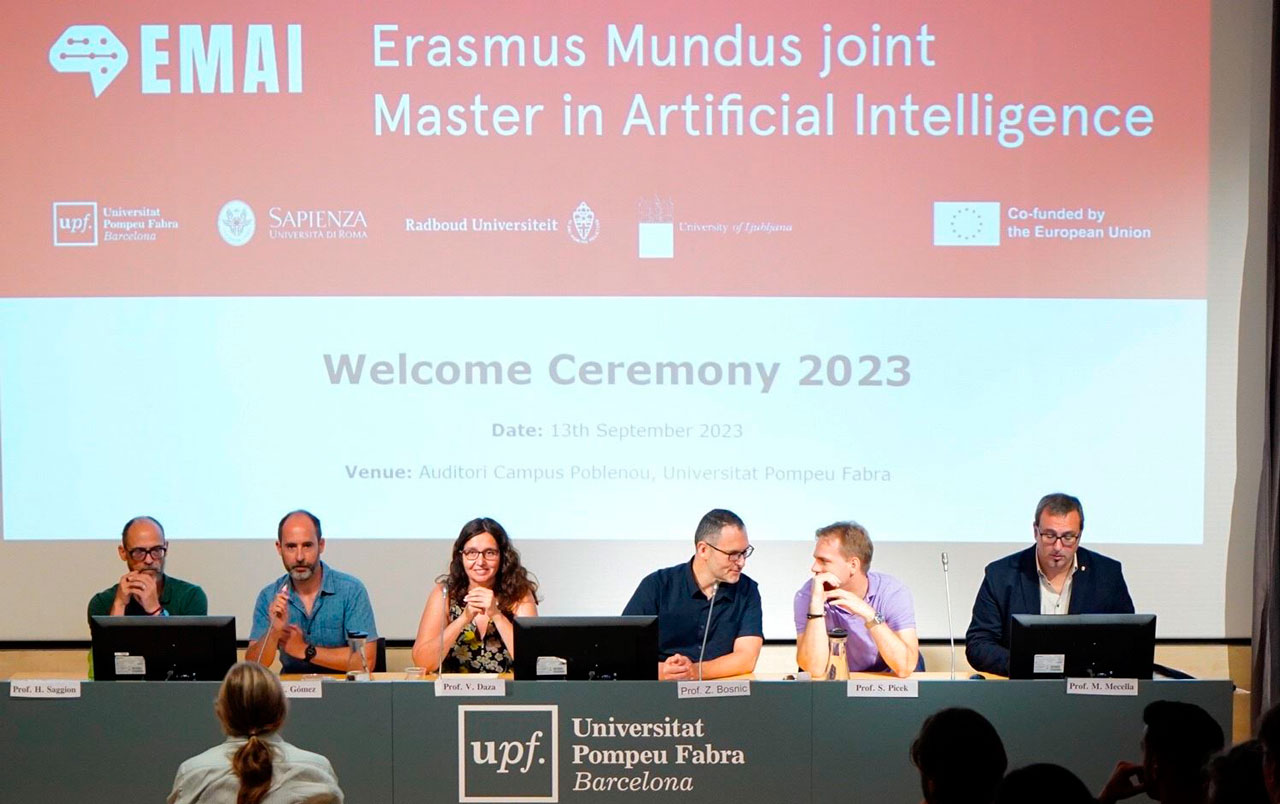
According to the programme’s coordinator, Vicenç Gómez (UPF), this considerable interest in the programme is above all due to the fact that ‘artificial intelligence is a very hot topic, with a lot of applications and unprecedented social implications’. This view was corroborated by several students on the EMAI, when explaining why they chose to broaden their training in this field. As Nazanin Niayesh, a 23-year-old student from Germany, said, ‘Today, knowledge and research into AI are helping to improve many different aspects of our lives. AI can significantly boost efficiency and productivity by automating routine tasks. By allowing us to focus on more creative and complex tasks, it also fosters innovation.’
Being part of the Erasmus Mundus network makes it possible to attract student talent from around the world
In addition to the interest generated by the field of AI itself, according to the EMAI coordinator, the high demand for the master’s programme is also due to the Erasmus Mundus programme’s powerful dissemination potential. The European Union’s Erasmus+ programme provides financial support to fund and disseminate the studies. They also have the support of the Erasmus Mundus Students and Alumni Association (EMA), which helps amplify information about the different options for the master’s programme through its communication and exchange networks.
Joining the Erasmus Mundus network thus makes it easier for universities to ‘attract students from around the world’, which, according to Gómez, is one of the main goals of the four members of the EMAI consortium. In view of the large number of applications received for the programme, ‘criteria of academic excellence’ were applied to select the twenty successful candidates, six of whom are women. Although the master’s team, which is affiliated with UPF’s Department of Information and Communication Technologies (DTIC), also took gender into account, the presence of fewer women in tech in general prevented them from achieving parity in the first edition.
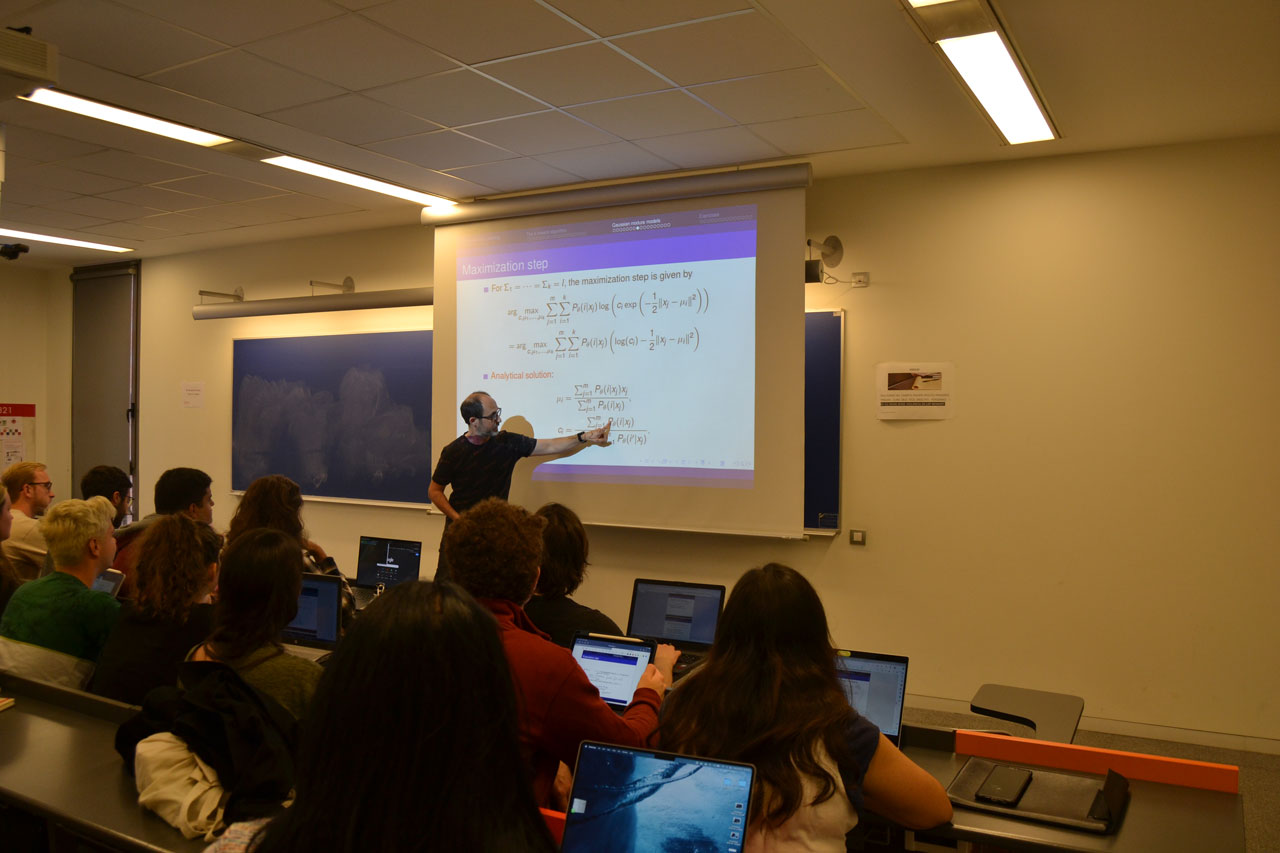
The DTIC takes on the challenge of coordinating the Erasmus Mundus in AI with 25 years of experience in the field under its belt
To take on the challenge of coordinating a master’s programme of this scope, the DTIC has drawn on its accumulated experience in the field of AI in recent years. In Catalonia and Spain, the DTIC is the only technology research department to twice receive the María de Maeztu seal of scientific excellence, awarded by the Spanish State Research Agency, following its renewal in November 2022.
According to Vladimir Estivill, head of the DTIC, artificial intelligence is of paramount importance within the DTIC’s fields of research. ‘The DTIC has incorporated research in artificial and natural intelligence since it was founded twenty-five years ago. It is an extremely strong department in the fundamentals of AI, with extensive expertise in its application in different fields.’ Computer vision, the interpretation of medical images or the use of machine learning to optimize 5G and 6G wireless networks are just some of the fields in which different DTIC research groups apply AI.
In addition to the research conducted in this field, prior to teaming up with the other three member universities of the EMAI consortium, the DTIC also offered a master’s programme in Intelligent Interactive Systems (MIIS), which it continues to offer today, also under Gómez’s coordination. The interest in expanding and internationalizing the master’s studies in this field was likewise a factor in the launch of the EMAI.
Vladimir Estivill, head of the DTIC at UPF: ‘The master’s programme involves collaborating on teaching, but also on AI research at the European level’
Since the launch of the new Erasmus Mundus programme in AI, new opportunities have been opening up for all the member universities of the EMAI consortium. ‘The master’s programme involves collaborating on teaching, but also on AI research at the European level. Students’ projects will create an explicit link of cooperation between research groups from the different participating universities’, Estivill underscored.
In UPF’s case, the master’s programme will place the university in a ‘position of leadership’ within the Erasmus Mundus programme, Gómez said. This is the first time UPF has coordinated this type of programme, although the university was already participating in three Erasmus Mundus programmes in other disciplines: Law and Economics (coordinated by Erasmus University of Rotterdam), European Politics and Society (coordinated by Charles University in Prague), and Sports, Ethics and Integrity (coordinated by the Catholic University of Leuven).
Helena Ramalhinho, vice-rector for Internationalization at UPF, also highlights the importance of coordinating this master’s programme for the university. ‘Leading an Erasmus Mundus master’s programme is an important challenge for UPF. Erasmus Mundus Joint Master programmes are prestigious international programmes recognized around the world. This programme in particular moreover deals with one of the most current and relevant issues of our time: AI.’ The EMAI will also contribute to UPF’s internationalization strategy, she added. ‘The strategy for the next few years is to maintain and increase the level of internationalization. A prestigious master’s programme like the Erasmus Mundus Joint Master in Artificial Intelligence will undoubtedly help with this strategy.’
An international master’s on the main AI paradigms and their application in various fields
Within the field of artificial intelligence, the EMAI curriculum addresses the main paradigms, related to machine learning and symbolic reasoning, and their application in various fields. Concerning the curriculum, Gómez said, ‘Our goal is to provide training in this discipline at not only the practical level, but also the theoretical one, so that students can not only apply AI techniques and methods, but also understand the fundamentals thereof in order to develop new ones.’ In this way, it complements the offer of existing master’s degrees in AI, more focused on its application in specific fields, such as robotics, law or data science.
The master’s programme consists of 120 ECTS credits, spread out over two academic years. The first year, all students will do the first semester at UPF, in Barcelona, and the second semester at any of the other three member universities of the EMAI consortium. The second year, they will be able to choose from among the four universities, depending on their preferred area of specialization: intelligent decision-making, robotics, cybersecurity or data science.

The EMAI’s four specializations: intelligent decision-making, robotics, cybersecurity and data science
UPF will teach the specialization in intelligent decision-making, as it is one of its main fields of AI-related research and a subject of study for several DTIC research groups. In particular, the Artificial Intelligence and Machine-Learning research group – to which many of the driving forces behind the EMAI belong, including Gómez himself – is highly specialized in this subject.
Sapienza University in Rome (Italy) will teach the EMAI specialization in robotics. According to Massimo Mecella, a professor of engineering and computer science at the university, ‘We offer training on the representation of knowledge and formal methods in everything related to artificial intelligence and the area of robotics.’
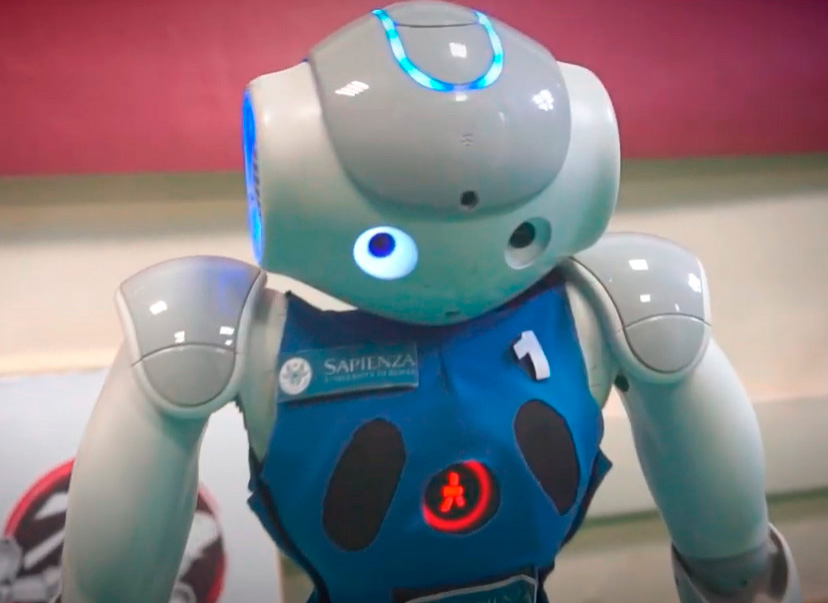
The cybersecurity specialization will be taught at Radboud University (Netherlands), which has ‘extensive experience and is widely recognized as a leader in the field of cybersecurity and mapping’, explained Stjepan Picek, an associate professor at the Dutch university
Finally, the data science specialization will be taught at the University of Ljubljana (Slovenia), whose main areas of expertise include this field. Zoran Bosnić, a professor at the university, highlighted the ‘strong connection’ between AI and data, which are used to train it.
Neus Vegas, as 23-year-old student from Catalonia, will move to Ljubljana to train in this specialization. Vegas considers it essential to learn how to manage and exploit the massive volumes of data existing in multiple fields, such as the environment, education or health, and would like to carry out projects to make it possible. ‘The curriculum for this specialization focuses on teaching students to manage and analyse these databases, whilst also offering the possibility to take subjects exclusively dedicated to project development, another of the reasons why I ultimately chose this programme.’

In contrast, Aleksandar Dimitrievikj, a 22-year-old student from Macedonia, chose to stay in Barcelona to specialize in intelligent decision-making at UPF. ‘Decision-making is at the heart of artificial intelligence and human cognition. It shapes our everyday life and is fundamental in multiple industries, making it a field of utmost importance.’
The twenty students from the first edition of the EMAI programme, selected from among more than 1,000 applicants, have outstanding academic records and received scholarships for the tuition fees – 18,000 euros for the two years of study – through the EU’s Erasmus+ programme. Most have also received a grant to cover travel, accommodation and mobility expenses.
Vicenç Gómez, coordinator of the EMAI: ‘The main goal is to train researchers [...]. But we obviously try to strike a balance between training researchers and training people who will go on to work in industry’
In addition to receiving financial support for their training, EMAI students will have the opportunity to come into contact with the research world and the various professional sectors that apply AI technologies. In this regard, Gómez clarified, ‘The main goal is to train researchers, who can also stay on to pursue a doctorate at one of the participating universities. But we obviously try to strike a balance between training researchers and training people who will go on to work in industry.’ The career prospects for EMAI graduates can include positions at companies or research centres in various fields: intensive data processing, process automation, robotics, cybersecurity, intelligent decision-making, the application of generative AI tools, etc.
The master’s programme itself provides for the collaboration of companies and research centres. ‘Companies pose challenges that allow students to put their knowledge into practice. For example, a company might want to understand how certain data are generated or how to create an algorithm to predict a given behaviour’, Gómez explained.
In addition to the four universities that are offering the master’s degree programme, the EMAI consortium has business and research partners from around the world. One of the most prestigious research institutions affiliated with the EMAI is the Centre for Artificial Intelligence at University College London.
Amongst other things, the London-based institution will organize the Summer School, where EMAI students will have the opportunity each year to exchange knowledge and perspectives in a more relaxed and informal setting, as well as to train and reflect on the ethical implications of AI. The curriculum for the master’s degree programme is primarily focused on technical subjects, although there are some specific subjects on ethics. The Summer School, however, will provide forums to reflect more broadly on an issue that goes beyond the sphere of technology and has social, political and legal implications. It will also include sessions on topics related to entrepreneurship or knowledge transfer. In addition to the Summer School, an event with similar goals will be held in the spring, with the involvement of other universities.
María Eugenia Fuenmayor, scientific director of Digital Technologies at Eurecat: ‘The integration of EMAI students in professional environments can provide solutions to industry by linking the two visions, academic and industrial’
In Spain, programme partners include institutions such as the Eurecat Technology Centre in Catalonia, which helps companies in the region become more innovative and competitive, particularly in fields such as robotics, cybersecurity, multimedia and digital healthcare.
For María Eugenia Fuenmayor, scientific director of Digital Technologies at Eurecat, training professionals specialized in AI with initiatives such as the EMAI is essential. ‘Increasingly, the solutions that Eurecat provides in almost all areas include AI for process automation, the analysis of large amounts of data and decision-making [...]. The technology has taken on so much importance that the demand is currently outpacing the supply, making it difficult to find these kinds of professionals.’ Eurecat applies AI in fields as diverse as energy, water or manufacturing, amongst others.
The Eurecat director considers collaboration with academia essential, at both the national and international levels. ‘The Erasmus Mundus allows us to expand and deepen these relationships, opening the doors to future collaborations on research projects, study periods abroad for doctoral students and researchers, and the recruitment of postdocs.’ Eurecat has its own competitive grant programme for doctoral students.
The technology centre will provide students with a multidisciplinary work environment in which to develop their skills, through its 19 units, organized into four areas: industry, digital, biotechnology and sustainability. ‘The integration of EMAI students in professional environments can provide solutions to industry by linking the two visions, academic and industrial’, said Fuenmayor.
Seventeen partners from the business and research world from seven countries collaborate with the EMAI
Eurecat is just one example of the many research centres and companies that collaborate with the EMAI – 17 in all – from seven countries: the UK, Italy, Spain, Slovenia, the Netherlands, China and the US.
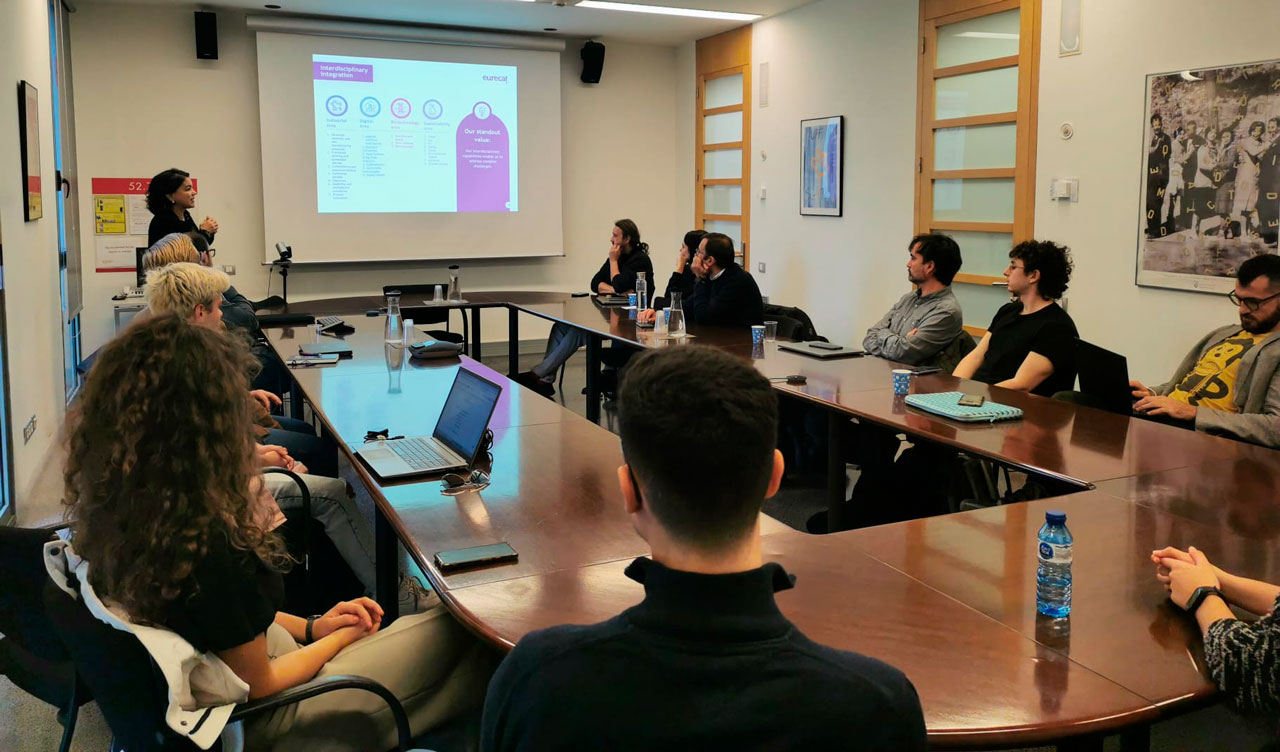
Companies and centres affiliated with the master’s programme basically cooperate in two ways. One option is to offer students the possibility of doing an internship, in which they participate in some of the projects already underway. Within the curriculum for the master’s programme, this option is an optional subject. The second option is for the students to do their master’s degree final project in collaboration with a company (under the supervision of a company manager and their supervisor at the university). Although the master’s degree final project is compulsory for all students, they can choose to do it in collaboration with a company or research centre or exclusively in the university setting. In addition to these two options, some of the EMAI consortium partners collaborate on the dissemination and promotion of the studies.
The programme’s intercultural atmosphere: another incentive for students
In addition to the opportunities that the master’s programme offers to train in AI and put into practice the knowledge acquired at research centres and companies, it has another added value: its international and intercultural nature. This academic year, students from thirteen countries are participating in the training pathway, including students from Spain, Italy, Germany, Macedonia, Romania, Bulgaria, Costa Rica, Ireland, the Netherlands, Portugal, the UK, Turkey and Cyprus.
For many of the students, this intercultural environment is another incentive to take the master’s programme. According to Djibril Coulybaly, a 24-year-old student from Ireland, ‘This opportunity means more than making academic progress: it is a platform for exchanging ideas, understanding different perspectives and enjoying an inclusive environment of collaboration on high-impact projects. Building a global network through these interactions is invaluable in the constantly evolving field of artificial intelligence.’
Beyond being a training pathway, the EMAI is, thus, a place for interaction, between students, universities, research centres and companies from different countries. It is a network of relationships that can be a driving force and lever for change to advance AI and devise innovative solutions to the challenges facing today’s society.

Aleksandar Dimitrievikj, EMAI student specializing in intelligent decision-making
‘In a rapidly changing context such as that of artificial intelligence, it is important to address the highly sensitive issues involved in AI and to be aware of the continuous evolution of knowledge and research in this field [...]. I hope this programme will help keep me on the cutting edge of advances in AI and ensure that I can adapt to emerging technologies and play a fundamental role in shaping the future of AI.’
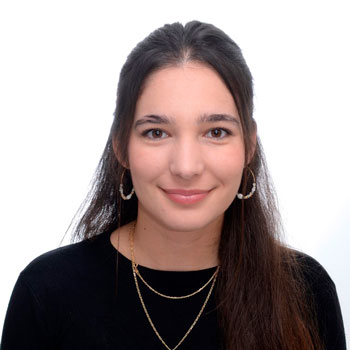
Neus Vegas, EMAI student specializing in data science
‘I realized that programming and artificial intelligence could play a crucial role in addressing some of the most urgent issues. For example, AI has already demonstrated its potential in areas such as the environment, education or health [...]. I want to work at the intersection of AI and healthcare, focusing on developing innovative solutions to address critical health challenges and improving patient outcomes.’
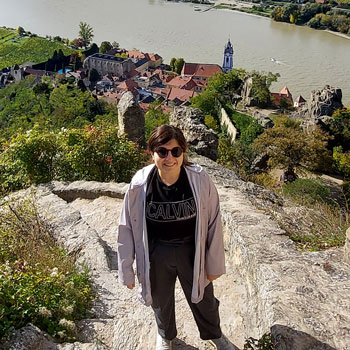
Nazanin Niayesh, EMAI student specializing in cybersecurity
‘I hope to gain a deep understanding of the principles of AI and cybersecurity and their applications, as well as to acquire more practical skills by participating in projects first-hand. I am also drawn to the programme’s international environment, which will expose me to new perspectives and allow me to build a global network of future AI professionals, researchers and colleagues.’

Djibril Coulybaly, EMAI student specializing in robotics
‘My curiosity in these fields drives my ambition to develop robotic solutions that can be used and adapted, seamlessly integrated into everyday life; to improve human abilities and make informed decisions in complex and unpredictable environments. I think that this approach could help pave the way to truly intelligent systems capable of working side by side with us to tackle some of the urgent challenges facing global society.’
